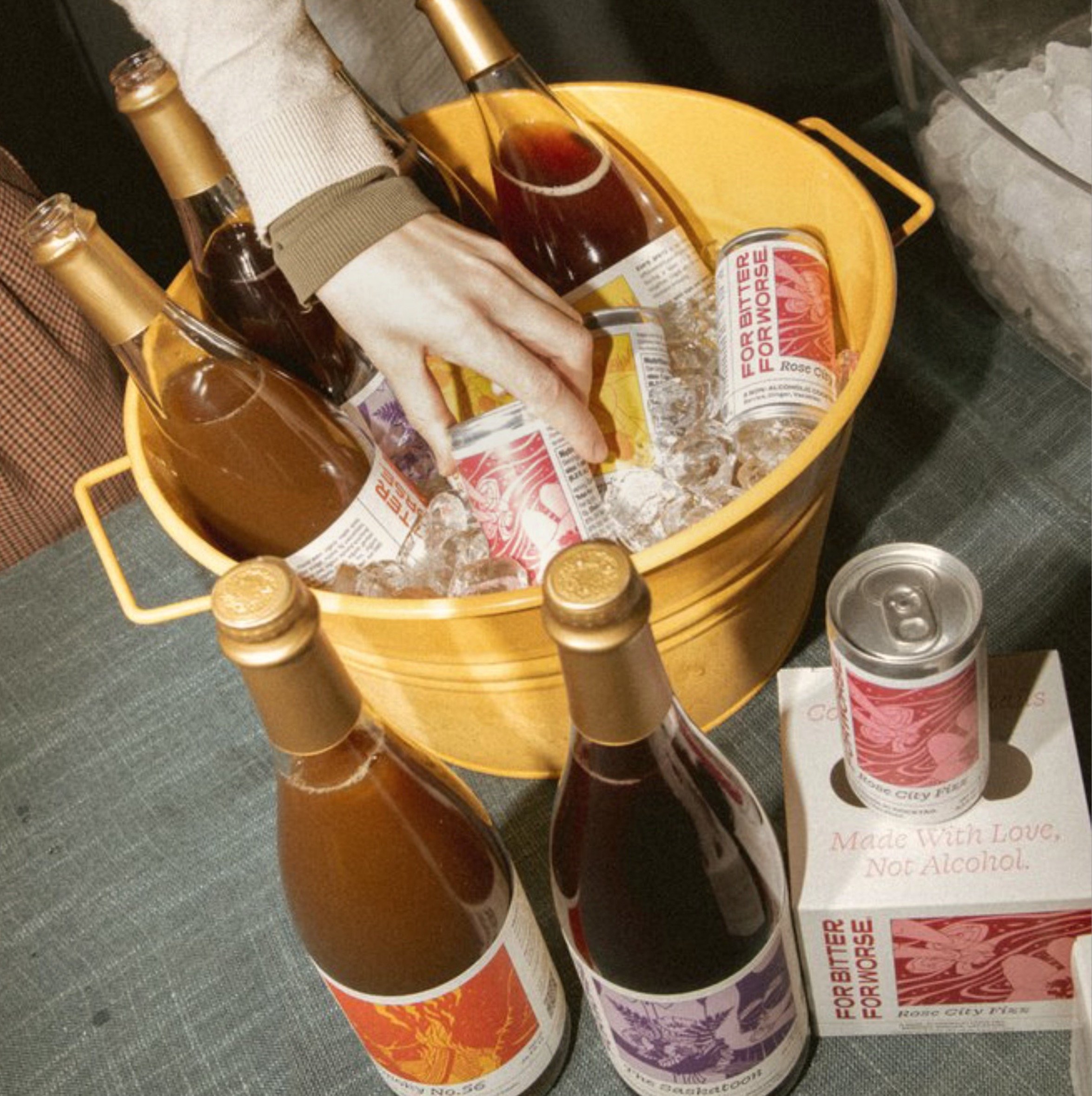The Libi Listings
The Libi Listings
Our mission is to connect the diverse and innovative network of local farmers, chefs, creators and brands with the broader culinary community, particularly those who are mission-driven and/or celebrating their culture or identity through food. See below a curated listing of those we are inspired by in the local food space who promote impact and community-building through their work.
-

Coffee Producer | Driftaway
Driftaway Coffee is an AAPI / immigrant-owned independent business committed to ethically sourcing beans from small-scale farmers worldwide and working hard to make these relationships equitable and transparent. They champion the empowerment and collaboration of women in the global coffee industry and prioritize buying 50% of the coffees they roast from women farmers.
-

Wine Producer | Dear Native Grapes
Dear Native Grapes is a project dedicated to restoring America’s native and hybrid grapes. Their winegrowing methods are modeled after holistic and regenerative philosophies, applied both on the farm and in the cellar.
-

Producer | Misomaru
Miso-Dama's (MISOMARU) history goes all the way back to the late 15th century to mid 16th century during the civil war era in Japan. Back then, MISODAMA was rolled and fired on the surface then dried under the sun, in order to keep long time during the transportation. Our MISODAMA keeps the same shape and similar recipe as 500 years ago. We individually roll MISOMARU by hand, using mindfully resourced ingredients, such as our own blend of rice koji Miso, Katsuobushi (Bonito flakes), Kombu (Seaweed) and Shiitake mushroom powder.
-
Beverage Producer | Acid
At Acid, their mission is to create a New Way to Drink Responsibly. They focus on finding unique ways to bring you a high quality product and achieve this by deploying projects that embody their core values of what it means to be seasonal, regional, and up-cycled. Collaborations with local businesses allow them to creatively up-cycle the remaining waste into something new — supporting a community-driven system. Rather than contributing to the waste cycle, they source and up-cycle existing food scraps from farms and local businesses, distilling them into a new spirit. From orange rinds to coffee grounds, they give new life to discarded, perfectly usable waste.
-

Chef & Food Writer | Annie Faye Cheng
Annie’s work, spanning various disciplines and subjects, reflects a reverence for knowledge, craft, and intent regarding all things food. She writes at the intersection of food, race, and power—sometimes as journalism, sometimes as culture pieces, sometimes as nonfiction.
Annie cooks with others, integrating technique and philosophy from her experiences in fine dining, fast food, butchery, popups, research and travel. On occasion, she has done private dinners and consulted on menus. Annie produces events that aim to tell stories and bring people together. She is obsessive about the intimate details: mapping out playlists for a garden dinner, making red envelope zines for a Lunar New Year popup, or inviting strangers turned friends to feed each other cake at a poetry workshop.
Annie is a student of all things, but formally pursuing a master’s in Labor Studies at the CUNY School of Labor and Urban Studies.
-

Producer | Dashi Okume
Okume, a dry goods wholesaler at the Tokyo Central Wholesale Market, was founded in 1871. With 150 years of history, they know a lot about Dashi. Japanese Dashi is a powdered broth made from bonito flakes, dried sardines, kombucha seaweed, and dried shiitake mushrooms. The broth is a lesson in food, created through a time-consuming process that goes beyond the simple nourishment of the body, nourishing the mind and spirit as well. Dashi Okume is currently the only company in the world that offers custom made dashi packs. Okume is committed to passing on the culture and protecting the tradition of Dashi, sharing the knowledge and skills acquired over generations of professionals.
-

Supper Club | Fancy Scraps
Fancy Scraps is a food waste-focused pop-up series, founded by Olivia Whitener, highlighting creative ways to make the most of every ingredient. Each menu is designed in collaboration with local chefs, farmers, and producers to feature up-cycled ingredients, recovered produce, and low-waste cooking techniques. Their pop-ups bring those passionate about food, people, and planet together over a shared meal.
-
Consultant | Kim Lerner
Kim Lerner is the founder of only yummy, always - a leadership coaching & hospitality consulting business, The School of Hospitality from Within and the host of Hospitality from Within Podcast. She also is a faculty member in the Culinary Arts Program at CUNY Kingsborough and the Institute of Culinary Education.
Kim’s hospitality career spans over 2 decades at some of the most well-respected establishments in New York City - where in each role she’s held, she continued to make an impact on her team, her community, and the ecosystem of the hospitality industry. On this journey through an ever-changing landscape, she defined the fundamentals of her own leadership style: kindness, trust, community, and building an in-house culture that transcends its four walls. It is this style of leadership that has made her a pioneer in the industry, challenging the status quo and always looking to better the climate of an industry she holds so dear to her heart.
The School of Hospitality from Within is a digital community and learning hub. It’s about redefining hospitality to teach our industry’s leaders how to show up for themselves first, so that they can best show up for others. Our “Lead with Confidence” course library teaches leaders to build confidence in their voice, to develop their own language and to create engaging and safe work environments through topics such as falling in love with coaching conversations, leading engaging pre-shifts, understanding your leadership archetype, and the power of accountability. This membership comes with hours of video and audio training, guidebooks, worksheets, templates and access to the Community Circle.
Use code ‘LIBI20’ for 20% off yearly membership
-

Digital Platform | Food People
The idea for Food People began, perhaps not ironically but rather intentionally, around a dinner table. They were American expats living in Rome, Italy who came together through friends of friends. With professional backgrounds in food security and food systems, naturally, most of our conversations tended to focus on the topic.
As they’ve moved around and grown our global network of friends working in the food space (whom they refer to colloquially as ‘Food People’), they decided to create Food People as a platform to bring together around a digital table the people who develop seeds, grow food, process the products, distribute the goods, consume meals and make decisions on the policies behind how the whole food system works.
-

For Bitter For Worse
Inspired by a long marriage and love for celebration, Shelley and Jeff created For Bitter For Worse after Shelley decided to give up drinking to help with a neurological malady that occurred after a whale-watching trip. A cocktail enthusiast, Shelley took up the challenge of creating non-alcoholic versions of all her favorite drinks, while Jeff converted these recipes to scalable formulas. Together, the couple has been starting parties with their boozeless cocktails since 2020. Designed for the sober and sober curious as well as those just wanting to drink less, For Bitter For Worse is built around community and inclusions. Their secret process, called reverse bootlegging, is how they avoid the common mishap of making mocktails too sweet. With no alcohol, no added flavors, and no artificial sweeteners, For Bitter For Worse is for anyone looking to feel good about what their drinking—without missing out on the party.
-

Accordion Wines
Accordion Wines does everything in the spirit of gentleness. Sourcing grapes from the Finger Lakes and Long Island, all grapes are carefully harvested by hand. No harsh chemicals or invasive techniques are used in the wine production—only a small press, smaller pump, and lots of time. Indigenous yeasts are used to ferment the grapes, producing an everyday wine that is locally produced.


